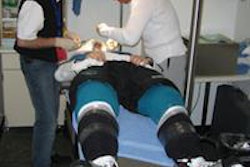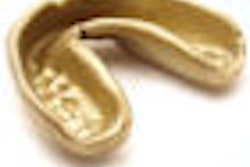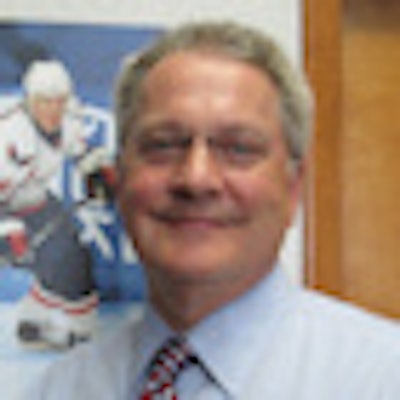
The scene, a tribute to the toughness of the hockey player, has been immortalized on YouTube: In the midst of the 2010 Stanley Cup quarterfinals, a high stick catches Eric Belanger in the mouth. Belanger sits down on the bench, reaches into his bloody mouth, and matter-of-factly plucks out a destroyed tooth.
What with flying sticks, sharp skates, slamming pucks, and swinging fists, professional hockey can be hell on the dentition.
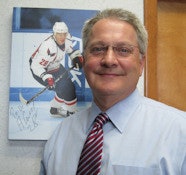 Thomas Lenz Jr., DDS, staff dentist for the Washing Capitals National Hockey League team.
Thomas Lenz Jr., DDS, staff dentist for the Washing Capitals National Hockey League team.
Regulations require every National Hockey League (NHL) team to have a dentist on staff. For the Washington Capitals, that would be Thomas Lenz Jr., DDS.
He is on hand for every home game, down in a medical office off the dressing rooms. He has no dental chair but works on a training table, coping with the lacerated lips, broken teeth, and fractured mandibles of both the home team and the visiting players.
"What we are doing, most of the time, is fixing them up so we can get them back on the ice," Dr. Lenz said.
That is the chief goal of any NHL team dentist, said Bill Blair, DDS, the immediate past president of the NHL Team Dentist Association and longtime team dentist for the Calgary Flames.
"These guys are paid to play hockey," Dr. Blair said. And nothing much will stop them, he added. "The pain threshold of the National Hockey League player is elevated far beyond the average Joe."
Such was the case for Belanger, who was playing for the Capitals the night he took that direct hit to his mouth. Dr. Lenz was there to assess the damage to the player's shattered bridgework and teeth.
"We gave him some Marcaine," the dentist recalled. "We took out the couple of pieces of teeth that we could, and he actually played the rest of the game."
The next morning, Dr. Lenz figured out which teeth could be saved and started doing root canals.
A different kind of subculture
For more than two decades, Dr. Lenz has been practicing dentistry in Vienna, VA, a picturesque, historic town not far from Washington, DC.
He grew up in a military family and played hockey as a kid. He earned his doctor of dental surgery degree from the University of Minnesota before moving to Virginia. After he and his wife Beth had their three children, he taught them all to skate while they were still very small. He has stayed deeply involved with youth hockey over the years and also with USA Hockey, the national governing body for the sport, which oversees everything from beginning players to the U.S. Olympic team. Dr. Lenz currently serves on the organization's board and also its safety and protective equipment committee.
“Working with the Washington Capitals has allowed me to enhance certain skills.”
— Thomas Lenz Jr., DDS
Dr. Lenz's sojourn with the Capitals began in 2005 with a call from the team's head physician, orthopedist Benjamin Shaffer, MD.
"This whole thing just sort of fell into my lap," Dr. Lenz explained. The team was preparing to move its training facility from suburban Maryland to northern Virginia and was seeking a new team dentist from the community.
Dr. Lenz told Dr. Shaffer he was "very intrigued." Dr. Shaffer called back an hour later and offered him the job.
With that, Dr. Lenz became part of an unusual world -- a world shared by just 50 or 60 dentists who serve the 30 teams of the NHL, according to Dr. Blair.
"It's a different subculture to be a sports dentist, to be a sports physician," Dr. Blair said. "You see the game and the players from a different perspective. You see them when they are hurt; the blood and guts."
Dr. Lenz doesn't often travel with the team during the regular season. But when a player has fractured his jaw, which happens a couple of times a season, the dentist will often go along to keep an eye on things.
"A couple of years ago, when Shaone Morrisonn was playing with us, he was playing with a fractured jaw that hadn't been disclosed to the press or anybody, and he didn't want to wear any additional facial protection," Dr. Lenz said. "Sometimes the guys will wear a fishbowl or plastic face guard to protect their jaw if it's fractured. He didn't want to do that because nobody knew he had fractured it, and he didn't want the other team to know it either. He had been wired shut, and we were undoing them before the game so he could breathe properly. After the game, we'd wire them back up."
Dr. Lenz also works closely with a local oral surgery specialty group to help players whose facial injuries require care that falls outside his area of expertise.
His office staff has taken the responsibilities of caring for the Capitals in stride, working injured players into the daily schedule so they are always ready for the next game.
"Sometimes I will even text my office manager and assistant from the game to let them know we need to be prepared to work one of the players into the schedule the next morning," Dr. Lenz said.
Not only the team members, but many of their wives, children, and team personnel also have become his patients.
"It's not just the players," Dr. Lenz said. "The trainers and the coaches and the front office people are really, really fine people to work with, so it makes it very enjoyable."
Dramatic dental injuries
While the pay is nothing too princely, Dr. Lenz said, his evening job has opened up new ways of looking at his profession. For one thing, dealing with dramatic dental injuries has become much more a part of his preventive and restorative practice.
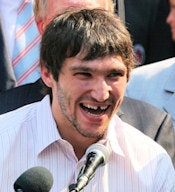 Alex Ovechkin addresses a crowd in Washington, DC, after receiving the key to the city in honor of his winning the NHL's Hart Memorial Trophy as league MVP for the 2007-2008 season.
Alex Ovechkin addresses a crowd in Washington, DC, after receiving the key to the city in honor of his winning the NHL's Hart Memorial Trophy as league MVP for the 2007-2008 season.
"We all deal with dental trauma in our offices occasionally, but for me once the season begins, I expect to be dealing with it on a regular basis," Dr. Lenz said. "Working with the Washington Capitals has certainly allowed me to enhance certain skills beyond what I would have ever had the chance to if I wasn't dealing with the type of injuries I see with these guys throughout the season."
He and Dr. Blair both stress the use of mouthguards with their players, but not always with success. Mouthguards are required for junior players, but not all professionals wear them. Times are slowly changing, though.
"When I first started, to have a few missing teeth was a badge of courage," Dr. Blair said.
Now more stress is placed upon the importance of protecting the teeth, and many young players who have grown up using mouthguards continue to use them when they become professionals, according to Dr. Lenz.
Still, the gap-toothed grin of Capitals star Alex Ovechkin remains a cherished team trademark. He was not wearing a mouthguard in 2007 the night he lost a front tooth in a match against the Atlanta Thrashers, Dr. Lenz said.
But he wears one now.
And though the fans love his swashbuckling smile, he has a post implanted where his tooth used to be.
"He wants to get it restored after he's done playing," Dr. Lenz said. "Honestly, it bothers his mom a lot more than it bothers him."




